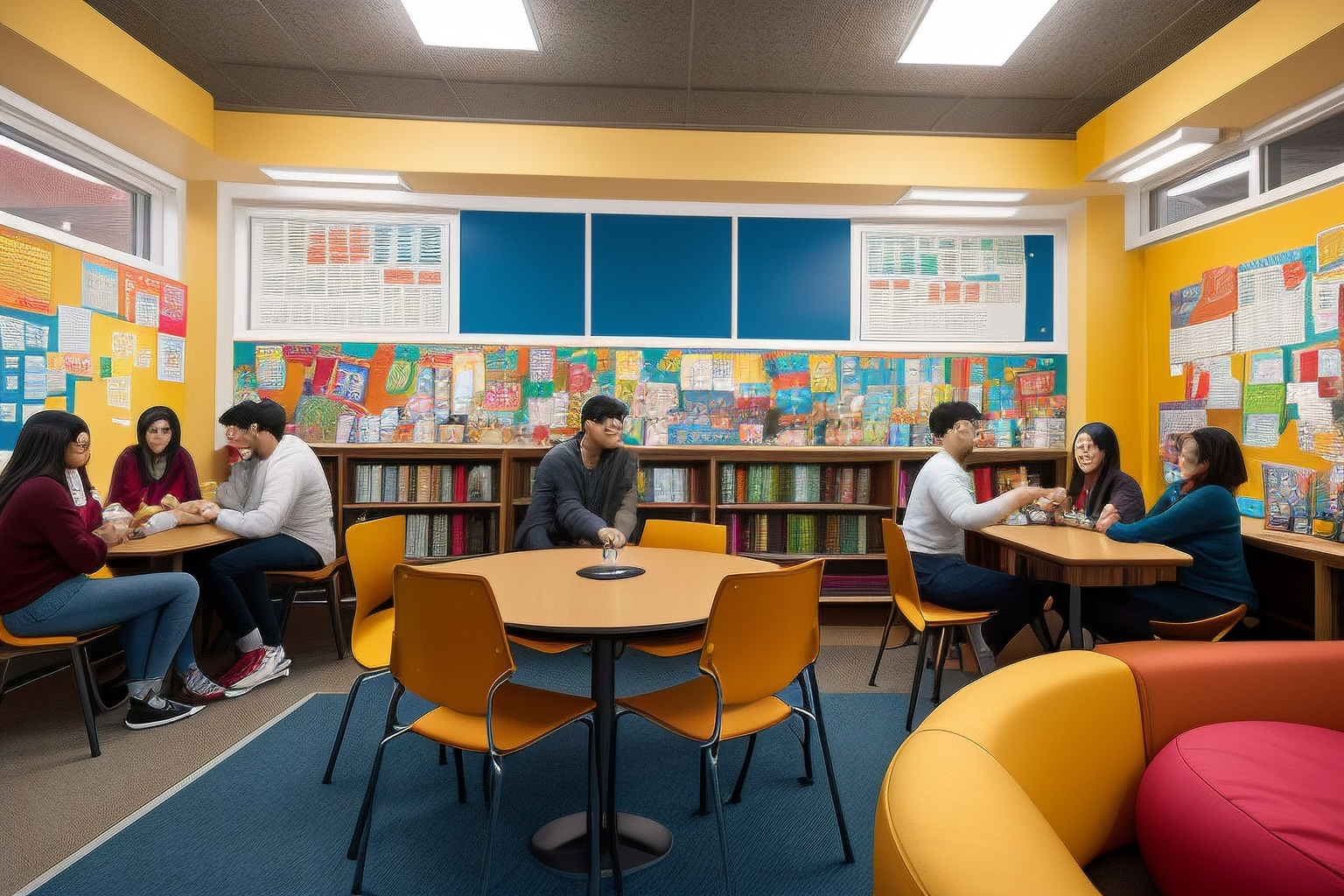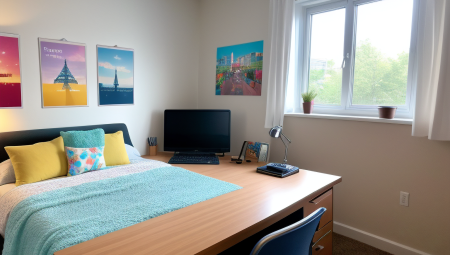Being a Resident Assistant (RA) is more than just a title; it’s a transformative journey that can shape your college experience in ways you might never expect. Imagine stepping into a role that not only enhances your personal growth but also equips you with skills that are invaluable in the real world. As an RA, you become a pivotal part of your community, fostering connections and building relationships that can last a lifetime.
This role challenges you to push your boundaries, enhancing your self-awareness and resilience. You’ll find yourself in situations that require quick thinking and adaptability, ultimately leading to increased confidence. Think of it as a crash course in life skills—from conflict resolution to effective communication. Each day presents new challenges, whether it’s mediating disputes among residents or planning engaging events that bring everyone together.
Moreover, being an RA opens doors to a network of peers, faculty, and professionals that can be instrumental in your future career. The relationships you build here often extend beyond the campus, creating a robust support system that can guide you through your academic and professional journey. So, if you’re looking for a role that offers personal growth, leadership opportunities, and a chance to make a real impact, becoming a Resident Assistant might just be the perfect fit for you!
Table of Contents
Personal Development
Serving as a resident assistant (RA) is not just about managing a dorm or overseeing students; it’s a profound journey of personal growth. Imagine stepping into a role that pushes you to confront challenges head-on, like a swimmer diving into the deep end for the first time. This experience fosters significant self-awareness and builds resilience, essential traits that shape your character.
As an RA, you will often find yourself outside your comfort zone, whether it’s resolving conflicts or planning events. This constant challenge cultivates confidence and enhances your ability to adapt to various situations. Think of it as a workout for your mind and spirit; the more you engage, the stronger you become.
Moreover, the role encourages you to reflect on your experiences, allowing you to identify your strengths and weaknesses. This process not only aids in personal development but also prepares you for future challenges. In essence, being an RA is like being a sculptor, chiselling away at the rough edges of your personality to reveal a more refined version of yourself.
Ultimately, the personal development gained from this experience extends far beyond your time in college. The skills you acquire—adaptability, confidence, and self-awareness—will serve as invaluable tools in both your personal life and professional career.
Leadership Skills
Being a resident assistant (RA) is like stepping into a dynamic leadership role that can transform your life. Imagine being the go-to person for your peers, the one who navigates through conflicts and brings people together. This experience is not just about managing a floor of residents; it’s about developing essential leadership skills that will serve you well beyond your college years. Through daily interactions, RAs learn to facilitate events, mentor fellow students, and create a welcoming environment, all of which are invaluable in any career path.
One of the most significant aspects of this role is conflict resolution. RAs frequently find themselves mediating disputes among residents, which sharpens their ability to negotiate and find common ground. This skill is like a toolbox; the more you use it, the more adept you become at handling various situations in both personal and professional settings.
Moreover, clear and effective communication is vital. RAs must articulate information and expectations clearly, which not only enhances their own communication skills but also fosters a culture of openness and trust within the community. This practice is akin to learning a new language; the more you engage with it, the more fluent you become.
Additionally, teamwork is a cornerstone of the RA experience. Collaborating with other staff members teaches individuals how to navigate group dynamics and work towards shared goals. It’s a bit like being part of a sports team; each member has a unique role, and together, they strive for success. Overall, the leadership skills gained as an RA are not just resume fillers; they are the building blocks of a successful future.
Conflict Resolution
As a resident assistant, you’ll quickly find that is not just a skill—it’s an art form! Imagine being in a room filled with diverse personalities, each with their own backgrounds and perspectives. Conflicts are bound to arise, whether it’s over noise levels, shared spaces, or differing opinions. This is where your role becomes crucial. You’ll be the mediator, the voice of reason, and sometimes even the peacemaker.
By stepping into this role, you’ll develop essential negotiation skills that are invaluable in both personal and professional realms. You’ll learn to listen actively, empathise with different viewpoints, and guide your peers towards a resolution that satisfies everyone involved. It’s like being a referee in a game where everyone wants to win, but your job is to ensure the game continues smoothly.
Moreover, each conflict you help resolve is a learning opportunity. You’ll discover various strategies to handle disputes, such as:
- Active Listening: Making sure everyone feels heard.
- Finding Common Ground: Identifying shared interests to foster cooperation.
- Staying Neutral: Keeping your personal opinions aside to facilitate fair discussions.
In the end, mastering conflict resolution not only enhances your leadership abilities but also equips you with a toolkit of skills that will serve you well throughout your life. Who knew that navigating through disagreements could be such a powerful growth experience?
Effective Communication
Effective communication is the backbone of a resident assistant’s role. Imagine being the glue that holds a community together, where every word you say can either uplift a resident or help them navigate a tough situation. As an RA, you’re not just sharing information; you’re creating an environment where residents feel heard and understood. This responsibility pushes you to refine your ability to articulate thoughts clearly, whether it’s during a one-on-one conversation or a group meeting.
Moreover, RAs must convey important messages, such as safety protocols or event details, in a way that resonates with diverse audiences. This involves not only speaking but also active listening, which is crucial for understanding residents’ needs and concerns. The ability to listen actively fosters trust and rapport, making residents more likely to approach RAs with their issues.
Additionally, RAs often find themselves in situations that require them to mediate conflicts. Here, effective communication becomes a vital tool for resolution. By articulating each party’s perspective and guiding them towards a constructive dialogue, RAs develop negotiation skills that are invaluable in both personal and professional settings.
In summary, the experience of honing effective communication skills as a resident assistant not only enriches the RA’s own life but also significantly enhances the community’s overall atmosphere, making it a win-win situation for everyone involved.
Team Collaboration
As a resident assistant, the essence of becomes vividly clear. Working alongside other staff members isn’t just about sharing tasks; it’s about creating a harmonious environment where everyone contributes to a common goal. Imagine a well-oiled machine where each cog plays a vital role in keeping everything running smoothly. This is what being part of a team feels like as an RA.
Throughout this experience, RAs learn to navigate group dynamics, which is a crucial skill in both academic and professional settings. They engage in brainstorming sessions, where diverse ideas flourish, and they must also tackle challenges together. This collaborative spirit fosters a strong sense of community among RAs, making it easier to support one another during tough times.
Moreover, teamwork in this role often involves:
- Sharing Responsibilities: Each member has their own strengths, and by delegating tasks, the team can achieve more than any individual could alone.
- Encouraging Open Communication: Effective dialogue ensures everyone feels heard, leading to better decision-making and problem-solving.
- Building Trust: RAs learn to rely on each other, creating bonds that extend beyond the workplace.
Ultimately, the lessons learned through team collaboration as a resident assistant not only enrich personal experiences but also equip individuals with the skills necessary for future teamwork scenarios in their careers.
Event Planning
As a resident assistant, one of the most exciting and rewarding responsibilities is . Imagine being the mastermind behind events that bring people together, create memories, and foster a sense of community. This role allows RAs to unleash their creativity while learning the ropes of project management. From brainstorming ideas to executing the final details, event planning is a journey filled with opportunities for personal growth and team collaboration.
When planning an event, RAs must consider various elements, such as:
- Budgeting: Understanding financial constraints and allocating resources wisely.
- Logistics: Coordinating venues, catering, and materials to ensure everything runs smoothly.
- Promotion: Crafting engaging marketing strategies to attract participants.
These tasks not only enhance organisational skills but also teach RAs how to work effectively under pressure. The thrill of seeing a well-planned event come to life—where residents mingle, learn, and enjoy—makes all the hard work worthwhile. Additionally, these experiences can be invaluable for future career paths, as employers often seek candidates who can demonstrate strong planning and execution abilities.
Networking Opportunities
Being a resident assistant opens up a treasure trove of that can significantly shape your future. Imagine walking into a room filled with peers, faculty, and professionals, all of whom share a common goal: to foster a vibrant community. As an RA, you’re not just another face in the crowd; you’re a vital link in a vast network. This role allows you to forge connections that can lead to mentorships, internships, and even job offers down the line.
One of the most exciting aspects of being an RA is the ability to build lasting relationships with a diverse group of individuals. These connections often extend beyond your college years, evolving into lifelong friendships and professional networks. Picture this: you meet someone during an event you organised, and years later, they become a key player in your career. It’s this kind of serendipity that makes the RA experience so enriching.
Moreover, working closely with university staff provides you with access to valuable resources and support systems. You’ll find that having a direct line to faculty and administration can be instrumental in navigating academic challenges and career planning. It’s not just about being a student; it’s about becoming a part of a larger community where collaboration and support thrive.
Building Relationships
Being a resident assistant (RA) is much more than just a job; it’s an incredible opportunity to build meaningful relationships that can last a lifetime. Imagine stepping into a role where you’re not just a guide but also a friend to your residents. This unique position allows you to connect with a diverse group of individuals, each with their own stories and backgrounds. By fostering an inclusive environment, RAs create a sense of belonging that is vital for students navigating their college journey.
These relationships often extend beyond the walls of the residence hall. Many RAs find that the bonds they form with residents evolve into lasting friendships and professional networks. This is crucial in today’s world, where connections can open doors to new opportunities. Think of it as planting seeds; with a little nurturing, those seeds can grow into fruitful collaborations and partnerships in the future.
Moreover, the role of an RA encourages open communication and trust. Residents feel comfortable sharing their challenges and triumphs, which not only strengthens the community but also enhances the RA’s ability to empathise and support others. In this way, RAs become pivotal figures in their residents’ lives, helping to cultivate a supportive network that can significantly impact their college experience and beyond.
Access to Resources
One of the most significant advantages of being a resident assistant (RA) is the unparalleled that comes with the role. RAs work closely with university staff, which opens up a treasure trove of support systems and informational resources. Imagine having a direct line to academic advisors, mental health professionals, and career services—all at your fingertips! This access not only helps RAs navigate their own academic challenges but also equips them with the knowledge to assist their peers effectively.
Furthermore, the connections forged with faculty and administration can prove invaluable. RAs often find themselves in unique positions to gain insights into university policies, procedures, and opportunities. This insider knowledge can be a game changer when it comes to academic planning and career development. For instance, RAs might learn about:
- Internship opportunities
- Workshops and seminars
- Networking events with industry professionals
These resources not only enhance the RA’s own experience but also empower them to foster a supportive community within their residence hall. By sharing these resources with residents, RAs help create an environment where everyone can thrive academically and socially, ultimately building a stronger, more connected community.
Time Management
Balancing the responsibilities of being a resident assistant (RA) with academic commitments is no small feat. It’s like juggling flaming torches while riding a unicycle—exciting but challenging! This experience significantly enhances time management skills, teaching individuals how to prioritise tasks effectively. Imagine having to organise an event, mediate a conflict, and study for exams all in the same week. It’s a whirlwind, but it’s also where the magic happens. By learning to manage their time wisely, RAs prepare themselves for the inevitable demands of both personal and professional life.
One of the key lessons RAs learn is the importance of setting priorities. With the myriad of responsibilities they face, RAs must discern what needs immediate attention and what can wait. This skill not only aids them in their role but also equips them for future challenges across various aspects of life. For instance, when faced with multiple deadlines, RAs often use strategies such as:
- Creating to-do lists to visualise tasks
- Setting specific time blocks for study and RA duties
- Utilising digital calendars to keep track of events and deadlines
Moreover, the ability to balance multiple commitments is a key takeaway from the RA experience. This skill translates seamlessly into the workforce, where juggling various tasks is often essential for success. Just think about it—an employer would much rather hire someone who can handle a busy schedule with grace than someone who struggles to keep up. In essence, the time management skills developed as a resident assistant serve as a solid foundation for future endeavours, ensuring that RAs are well-prepared for whatever challenges lie ahead.
Setting Priorities
As a resident assistant, becomes a crucial skill that can significantly impact your effectiveness in the role. Imagine juggling multiple responsibilities, from planning events to addressing resident concerns, all while keeping up with your studies. It’s a bit like spinning plates—if you don’t know which ones to focus on, they could come crashing down!
To master this skill, you need to understand what tasks are most important and urgent. A simple method is to categorise your tasks into a priority matrix:
| Task | Urgent | Not Urgent |
|---|---|---|
| Host a community event | Yes | No |
| Meet with a resident in distress | Yes | No |
| Plan next month’s activities | No | Yes |
This matrix helps you visualise what needs your immediate attention versus what can wait. By focusing on urgent tasks first, you can prevent small issues from escalating into larger problems, ensuring a smoother experience for both you and your residents.
Ultimately, the art of setting priorities not only enhances your performance as an RA but also prepares you for the demands of the professional world, where the ability to manage time effectively can set you apart from the competition.
Balancing Commitments
Being a resident assistant (RA) is like juggling flaming torches while riding a unicycle—it’s a thrilling challenge that requires skill and finesse! Balancing the myriad responsibilities of this role with academic commitments can feel overwhelming at times, but it’s an invaluable learning experience. RAs quickly learn to prioritise their tasks effectively, ensuring that they can support their residents while still excelling in their studies.
Imagine having to coordinate a community event, mediate a conflict, and prepare for an exam all in the same week. It’s a high-pressure situation, but it teaches RAs how to manage their time wisely. They develop a keen sense of when to focus on their studies and when to engage with their community. This ability to switch gears not only enhances their productivity but also prepares them for the fast-paced demands of the professional world.
Furthermore, RAs often find themselves employing various strategies to maintain balance. Here are some common techniques they use:
- Creating a Schedule: By mapping out their week, RAs can allocate specific time slots for studying, meetings, and social events.
- Setting Boundaries: Knowing when to say no is crucial. RAs must learn to protect their study time while still being available for their residents.
- Utilising Resources: RAs often tap into campus resources, such as study groups and academic support, to lighten their load.
In essence, the ability to balance commitments is not just a skill; it’s a vital life lesson that RAs carry with them long after their time in the role. This experience equips them with the resilience and adaptability needed to thrive in both their personal and professional lives.
Career Advancement
Serving as a resident assistant (RA) is not just about managing dorms; it’s a stepping stone to . The skills and experiences gained in this role are highly valued by employers across various industries. For instance, RAs develop leadership abilities that shine in any professional setting. Imagine being able to lead a team through challenges, just like steering a ship through a storm; that’s what RAs do every day!
Moreover, the experience of handling conflicts and facilitating discussions equips RAs with negotiation skills that are crucial in the workplace. They learn to navigate tricky conversations, making them adept at resolving issues efficiently. This is akin to being a skilled diplomat, where every word counts and understanding perspectives is key.
Additionally, having RA experience on a resume can significantly enhance a candidate’s appeal. It signals to potential employers that the individual possesses not only strong interpersonal skills but also a commitment to community and teamwork. In fact, a survey of hiring managers revealed that 85% believe leadership experience, such as that gained from being an RA, is essential for entry-level positions.
| Skills Gained | Benefits in Career |
|---|---|
| Leadership | Increases chances of management roles |
| Conflict Resolution | Enhances negotiation capabilities |
| Effective Communication | Improves networking opportunities |
In conclusion, the role of a resident assistant not only enriches university life but also lays a solid foundation for future career success. By honing essential skills and building a robust network, RAs are well-prepared to tackle the demands of the professional world.
Resume Building
Having experience as a resident assistant (RA) can be a game-changer when it comes to . Employers are on the lookout for candidates who not only possess technical skills but also demonstrate strong interpersonal abilities and a commitment to community. When you list your RA experience on your resume, it signals that you are a proactive individual who can handle responsibility and navigate complex social dynamics.
Think about it: as an RA, you’re not just supervising residents; you’re also acting as a mentor, a mediator, and an event planner. These roles develop a range of skills that are highly valued in the job market, such as:
- Leadership: Taking charge of a floor or hall, guiding residents, and making important decisions.
- Conflict Resolution: Navigating disputes and finding solutions that work for everyone involved.
- Effective Communication: Articulating ideas clearly and engaging in meaningful conversations with diverse groups.
When you articulate these experiences in your resume, you not only highlight your ability to manage responsibilities but also showcase your dedication to fostering a positive community. This can set you apart in competitive job applications, making you a desirable candidate for various roles. So, don’t underestimate the power of your RA experience—it’s more than just a title; it’s a valuable asset in your career journey!
Interview Skills
As a resident assistant, you’ll find that the experiences you accumulate are golden when it comes to . Imagine walking into an interview room, your heart racing, but instead of feeling overwhelmed, you draw upon your time as an RA. You’ve already navigated tricky conversations with residents, mediated conflicts, and organised events that required you to think on your feet. This background equips you with a unique toolkit that sets you apart from other candidates.
During interviews, you can confidently showcase your ability to articulate experiences effectively. For instance, you might explain how you resolved a disagreement between roommates, highlighting your negotiation skills. This not only demonstrates your conflict resolution abilities but also your capacity to remain calm under pressure. Employers love candidates who can handle real-life challenges with poise!
Additionally, your role as an RA has likely involved working with diverse groups, which enhances your communication skills. You’ve learned to tailor your message based on your audience, whether that’s addressing a group of new residents or presenting to faculty. This adaptability is crucial in interviews, where understanding the interviewer’s perspective can make all the difference.
Moreover, the practice of leading events and engaging with various stakeholders means you can speak to your leadership qualities with confidence. You can share anecdotes that illustrate your growth and learning, making your responses not just informative but also relatable. Remember, storytelling is a powerful tool in interviews!
Frequently Asked Questions
- What are the main benefits of being a resident assistant?
Being a resident assistant (RA) offers numerous advantages, including personal growth, enhanced leadership skills, and the opportunity to build a strong community. RAs learn to manage conflicts, plan events, and communicate effectively, all of which are invaluable in both academic and professional settings.
- How does being an RA improve my career prospects?
RAs develop critical skills such as conflict resolution, effective communication, and time management, which are highly valued by employers. Having RA experience on your resume can set you apart from other candidates, showcasing your ability to handle responsibility and work in a team.
- Can I balance my studies with the responsibilities of being an RA?
Absolutely! Many RAs successfully manage their academic commitments alongside their RA duties. The role actually helps improve your time management skills, teaching you how to prioritise tasks effectively, which is essential for success in both your studies and future career.
- What kind of support do RAs receive from the university?
RAs have access to valuable resources and support systems provided by the university. They often work closely with staff, which can help them navigate academic challenges and gain insights into career planning.





